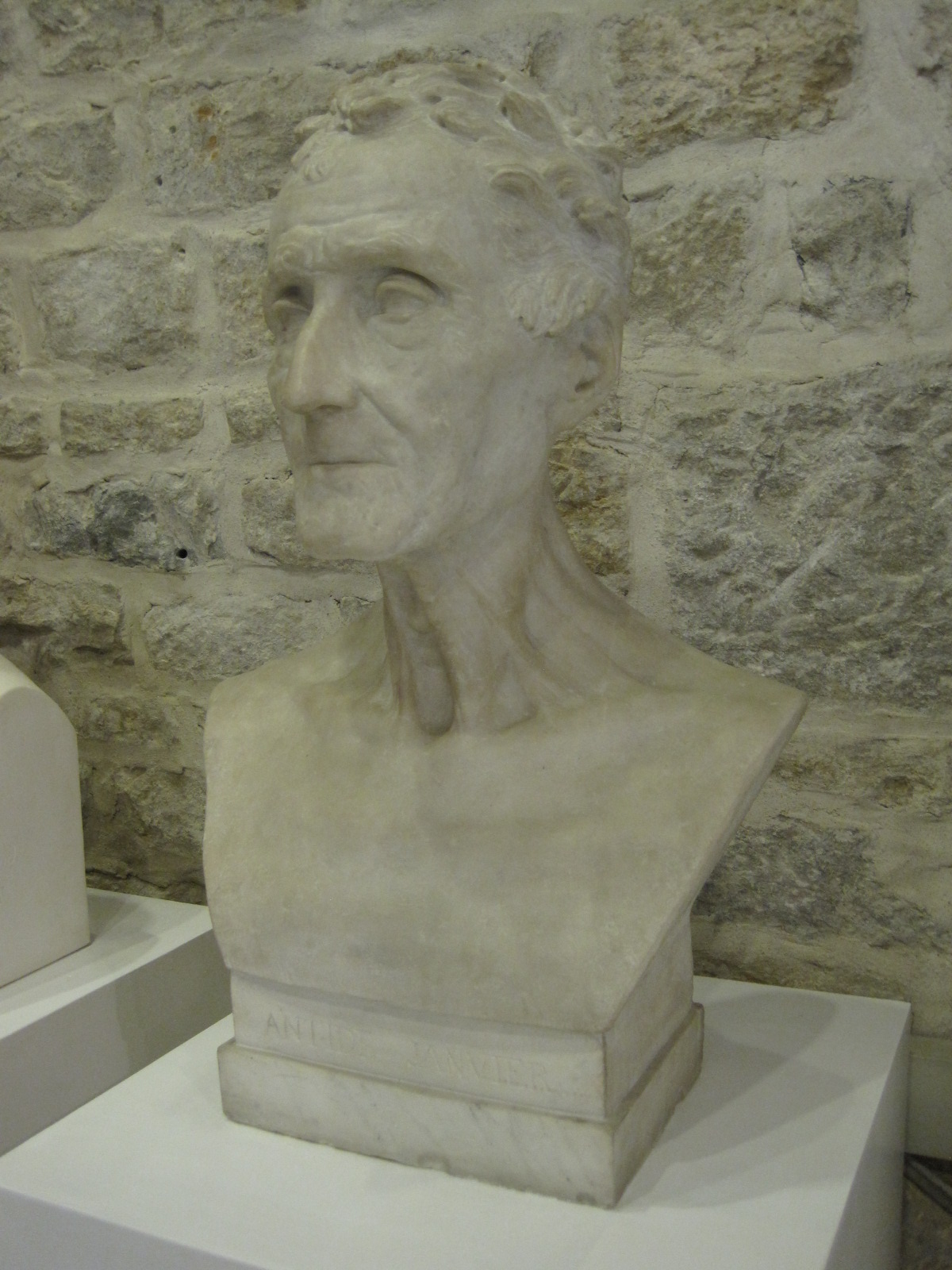Antide Janvier on:
[Wikipedia]
[Google]
[Amazon]

 Antide Janvier (1 July 1751 – 23 September 1835) was a French
Antide Janvier (1 July 1751 – 23 September 1835) was a French
Antide Janvier, Celestial clockmaker
by Michel Hayard, 1995.
Antide Janvier, Celestial clockmaker
by Michel Hayard, 2010 - Second edition completed and enlarged. {{DEFAULTSORT:Janvier, Antide 1751 births 1835 deaths 18th-century French inventors French clockmakers

clockmaker
A clockmaker is an artisan who makes and/or repairs clocks. Since almost all clocks are now factory-made, most modern clockmakers only repair clocks. Modern clockmakers may be employed by jewellers, antique shops, and places devoted strictly t ...
.
Life
Antide Janvier was born in a village in the Jura, and learned the basics of his trade from his father, and was educated inLatin
Latin (, or , ) is a classical language belonging to the Italic branch of the Indo-European languages. Latin was originally a dialect spoken in the lower Tiber area (then known as Latium) around present-day Rome, but through the power of the ...
, Greek
Greek may refer to:
Greece
Anything of, from, or related to Greece, a country in Southern Europe:
*Greeks, an ethnic group.
*Greek language, a branch of the Indo-European language family.
**Proto-Greek language, the assumed last common ancestor ...
, mathematics
Mathematics is an area of knowledge that includes the topics of numbers, formulas and related structures, shapes and the spaces in which they are contained, and quantities and their changes. These topics are represented in modern mathematics ...
and astronomy
Astronomy () is a natural science that studies astronomical object, celestial objects and phenomena. It uses mathematics, physics, and chemistry in order to explain their origin and chronology of the Universe, evolution. Objects of interest ...
by a local ''abbé''. At age 15 he built an astronomical sphere which he presented to the Academy of Sciences of Besançon
Besançon (, , , ; archaic german: Bisanz; la, Vesontio) is the prefecture of the department of Doubs in the region of Bourgogne-Franche-Comté. The city is located in Eastern France, close to the Jura Mountains and the border with Switzerl ...
, which won him wide admiration, and he began his career as an apprentice watchmaker.
He gained a reputation as a maker of ingenious and complicated clocks, including many astronomical clock
An astronomical clock, horologium, or orloj is a clock with special mechanisms and dials to display astronomical information, such as the relative positions of the Sun, Moon, zodiacal constellations, and sometimes major planets.
Definition
...
s and clocks showing the tides. He was also famous for his "double pendulum clocks", also called "Resonance clocks", which he was the first to make. He eventually became Louis XVI
Louis XVI (''Louis-Auguste''; ; 23 August 175421 January 1793) was the last King of France before the fall of the monarchy during the French Revolution. He was referred to as ''Citizen Louis Capet'' during the four months just before he was ...
's royal clockmaker. After the French Revolution
The French Revolution ( ) was a period of radical political and societal change in France that began with the Estates General of 1789 and ended with the formation of the French Consulate in November 1799. Many of its ideas are considere ...
he spent time in prison because of this royal association and then fell on hard times; his hardships were increased by the death of his wife in 1792. He sold his watches and equipment and designs to Abraham-Louis Breguet
Abraham-Louis Breguet (10 January 1747 – 17 September 1823), born in Neuchâtel, then a Prussian principality, was a horologist who made many innovations in the course of a career in watchmaking industry. He was the founder of the Bregue ...
, who sold watches under his own name. Following the restoration of the monarchy under Charles X
Charles X (born Charles Philippe, Count of Artois; 9 October 1757 – 6 November 1836) was King of France from 16 September 1824 until 2 August 1830. An uncle of the uncrowned Louis XVII and younger brother to reigning kings Louis XVI and Loui ...
, he was awarded a small pension beginning in 1826, but died in poverty and obscurity.
Works
He authored and published an important textbook on the theory and practice of watchmaking: "Manuel Chronométrique ou précis de ce qui concerne le temps, ses divisions, ses mesures, leurs usages", Published 1821 by Didot, Paris (267 pages, Frontispiece and 5 engraved foldout plates). He also produced a written account of twelve of his very original timekeepers, which was published 1827 under the title "Recueil des Machines composées et exécutées par Antide Janvier", which has been reissued 1995 in facsimile format by publisher "L'image du Temps" (56 pages). The largest, publicly-accessible, collection of Antide Janvier's masterworks is in the Musée Paul Dupuy inToulouse
Toulouse ( , ; oc, Tolosa ) is the prefecture of the French department of Haute-Garonne and of the larger region of Occitania. The city is on the banks of the River Garonne, from the Mediterranean Sea, from the Atlantic Ocean and from Par ...
.
Books
Antide Janvier, Celestial clockmaker
by Michel Hayard, 1995.
Antide Janvier, Celestial clockmaker
by Michel Hayard, 2010 - Second edition completed and enlarged. {{DEFAULTSORT:Janvier, Antide 1751 births 1835 deaths 18th-century French inventors French clockmakers